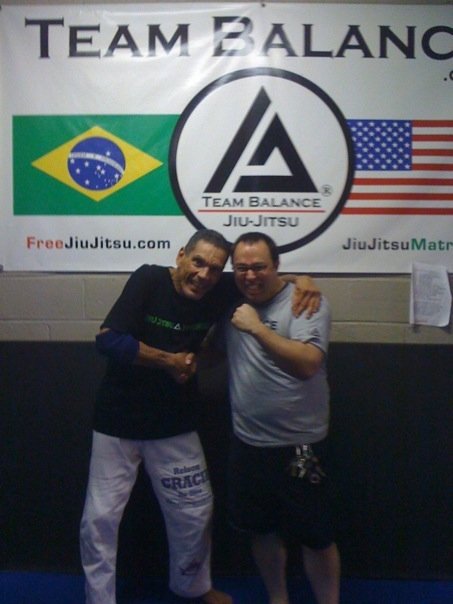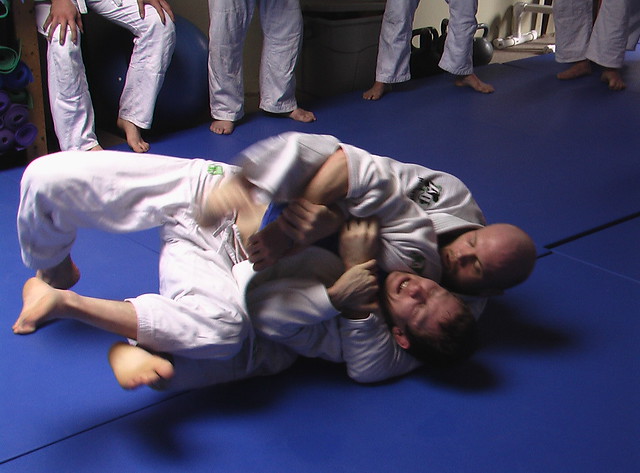Sink Swim or Fight?

It’s been almost ten years since I began training in Brazilian Jiu Jitsu and today it hit me. I need to decide to get better or I need to quit.
I get into physical things–no matter what they are–in the spirit of Steve Prefontaine. At first it may be curiosity, or frugality (I do a lot of my own remodeling at home), but the sustaining interest is powered by Pre: to see who has the most guts.
Brazilian Jiu Jitsu is first about guts. Stepping on the mat places you in a world where few enter and fewer and fewer stay. That is not even considering the levels of success any one may achieve.
In my experience, my learning curves are steeper than some. Over time they regress to the norm as they should. Depending on the domain, they may stay ahead of those around me. I know this about myself and, admittedly, I allow it to prevent me from working hard–norm calibrated rather than criterion calibrated. As a musician I could stay pretty consistently ahead of the curve when in a new situation without any effort.
That is a confession not braggadocio.
It is shameful to think that spending time practicing could have produced a variety of outcomes, some with life changing potential. I did not act.
While an undergrad it became known that I played the french horn though it was not my major instrument. The orchestra director offered to secure an instrument and I requested weekly lessons in exchange for my participation. A golden opportunity to study with a well known musician and to perform both repertoire and some contemporary music. My teacher told me I had a beautiful tone and excellent pitch. I rarely practiced. Made plenty of mistakes in rehearsals. It did not last but I look back and wonder what could have been different if I took hold of that opportunity wholeheartedly.
I am reminded of an Old Testament passage where the prophet Elisha tells the King of Israel to strike the ground with an arrow.
18 And he said, “Take the arrows,” and he took them. And he said to the  king of Israel, “Strike the ground with them.” And he struck three times and stopped. 19 Then the man of God was angry with him and said, “You should have struck five or six times; then you would have struck down Syria until you had made an end of it, but now you will strike down Syria only three times.” (2 Ki 13.18-19)
king of Israel, “Strike the ground with them.” And he struck three times and stopped. 19 Then the man of God was angry with him and said, “You should have struck five or six times; then you would have struck down Syria until you had made an end of it, but now you will strike down Syria only three times.” (2 Ki 13.18-19)
That being said, I can always say that I could have done more. And further, I am not including all of the other life factors that may have had a genuine influence on how committed I was to the work. AND I was a kid–that was a lifetime ago.
Bringing me back to my practice of Jiu Jitsu and my attempt to maintain an reflective awareness of my practice. When I began studying Jiu Jitsu, I was good. Or, at least, that is what I was told by others. I was able to get to class three or more times each week and was not in tremendous shape. I watched videos and read books about Jiu Jitsu. I was in. Deep.
Jump ahead. Craniotomy. Complete grad school. Have a daughter. Buy a house, work on house, move, keep working on house. Have a son. Shoulder repair. Change jobs. That last few years have not had me on the mats very much at all. Schedules have been rough. Recovery from a recent surgery was slower than expected. I have been on the mats twice since getting the OK from the doctor.
What was most clear today is that everyone has improved. My skills that were competitive a few years ago are not as competitive as they were. Attribute some of that to rust and being a little gunshy with the shoulder, fine. I was constantly scrambling and defending. Out of breath. HOT.
Granted, I managed to get in a full class and three or four sparring matches afterwards. All tough matches for me–I like to train with people who are better than me and I do not mind “losing” at all. I say “losing” because we all know that it means very little to tap or reset a sparring match. Some folks still keep track. I do. A little.
I am tired and sore. Worse than that is that I know what I need to do to improve and have to decide if I am willing to start doing it.





